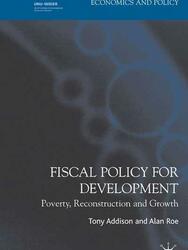Book
Fiscal Policy for Development
Poverty, Reconstruction and Growth
Fiscal policy is critical to the development of poor countries. Public spending on pro-poor services and public goods must be increased, tax revenues must be mobilized, and macro-economic stabilization must be achieved without inhibiting growth, poverty reduction and post-conflict reconstruction. This book provides both a comprehensive and balanced guide to the current policy debate and new results on the development impact of fiscal policies. It is essential reading for students of development economics as well as all those seeking to improve policy-effectiveness.
 Join the network
Join the network